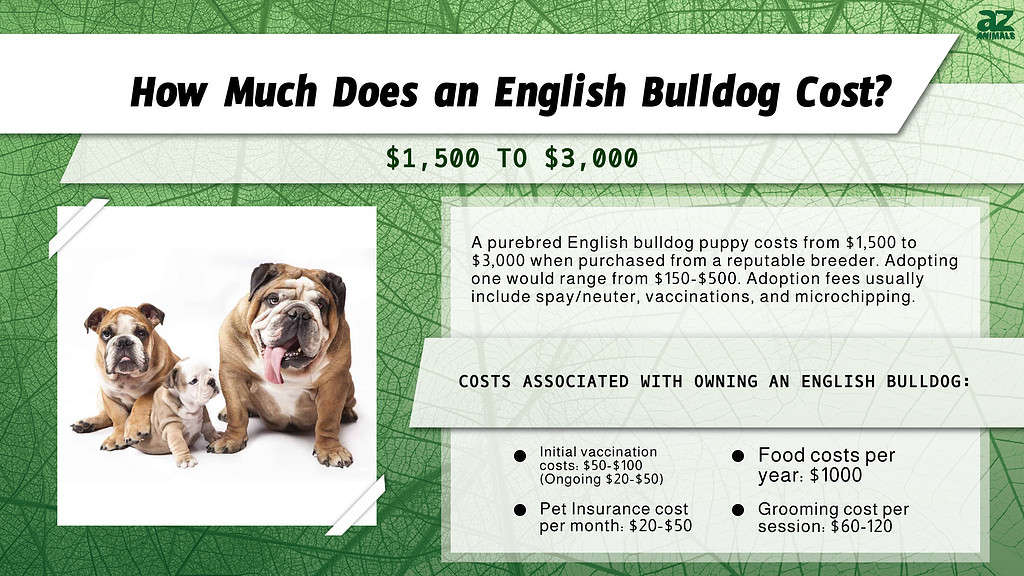English bulldogs (Canis lupus familiaris) are known for their distinctive smushed faces, extreme underbites, and slothful dispositions. Because of this, they have captured the hearts of dog lovers all across the globe! Originating from the British Isles, this breed made history in 2023 by winning Best in Show at the 22nd Annual American Kennel Club National Championship. Though there is some controversy around the ethics of breeding English bulldogs, it comes as no surprise that these wrinkly dogs are among the most sought-after in the United States! While that is true, training these dogs can sometimes pose unique challenges for their owners. Fear not, though! In this article, we will explore the best tips for training your English bulldog, along with the breed’s fascinating background and common mistakes to avoid to ensure your bulldog is the happiest and healthiest they can be!
The English Bulldog’s Origins

©Lakshmi3/iStock / Getty Images Plus via Getty Images
According to the American Kennel Club, the English bulldog was first bred in the United Kingdom around the 13th century. Believed to have descended from the Asiatic mastiff and the pug, this breed was named for their use in bull-baiting. Though today this barbaric blood sport is banned in most countries, it used to be one of the most popular in England, Ireland, and Scotland. To “play” this recreational activity, dogs were set loose to harass and/or physically attack a tethered bull. At the time, it was also believed this practice improved the “quality, taste, and tenderness” of the bull’s meat. English bulldogs were specifically bred for this activity due to their strength, courage, and overall tenacity, making them the perfect breed for this medieval European sport.
Health History of English Bulldogs

After bull-baiting was outlawed due to animal cruelty concerns, bulldogs quickly transformed from ferocious matadors to the adorable, loving companions we know them as today! While this breed is undeniably adorable, they do come with some specific health concerns that prospective owners should be aware of. Here are the top five health facts to keep in mind if you own — or plan to own — English bulldogs.
Possible Health Conditions
Respiratory Health: Bulldogs, like Boston terriers and pugs, are considered brachiocephalic. This comes from two Greek words “brakhu,” meaning short, and “cephalos,” meaning head. It’s a term commonly used by vets to describe any dog with a short, pushed-in, or flattened nose (face). This can result in mild to severe breathing problems, which are especially worsened by hot, humid weather. This is because their short muzzles make it hard for them to regulate their body temperature efficiently. So, if you own a bulldog, try to keep them in cool environments or avoid strenuous exercise on hot days. Besides that, it is important that you never leave them unattended in extremely hot or cold weather for extended periods.
Skin Fold Care: Besides their super-smooshed faces, bulldogs also have a multitude of skin folds — particularly around their snout and tail. Similar to that of shar peis, this unique feature makes bulldogs susceptible to bacteria growth and yeast infections. If your dog has lots of wrinkles, make sure to regularly clean and dry them to prevent painful skin conditions and dangerous infections.
Regular Veterinary Check-Ups: As previously evidenced, English bulldogs are predisposed to certain health issues. Besides skin conditions and temperature regulation problems, hip dysplasia, cherry eye, and heart problems are also common ailments of this breed. Because of that, regular veterinarian check-ups are crucial to catch any issues early on and help manage them effectively.
Main Mistakes Made During English Bulldog Training (and What To Do Instead)
1. Harsh Training Methods

Large orange and black remote training collar for dogs. Device used for obedience training, recall, or to reduce or stop barking. Selective focus. Isolated on white.
©Petra Richli/iStock / Getty Images Plus via Getty Images
Even though today’s English bulldogs are descendants of literal bullfighters, they are still quite sensitive. Like many other dog breeds, they do not respond well to harsh training techniques. Avoid yelling or physical punishments when training your puppy because this could lead to future reactivity or even aggression.
Instead, try implementing positive reinforcement.
Bulldogs can be a bit stubborn, so patience and persistence are crucial from the start. Understanding the unique personality traits of your canine companion will also go a long way toward making your training sessions more successful! Typically, English bulldogs respond well to positive reinforcement. Praise, physical affection, or treats (in moderation) can help to encourage good behavior in your dog.
2. Inconsistency

©ltummy/Shutterstock.com
English bulldogs perform best when they understand what is going on and what they can expect in the future. Changing up the rules, routines, or outcomes too frequently can confuse your dog and hinder their overall growth.
Instead, try being consistent with their training.
As with any other pet, it is important to implement a consistent routine for training and discipline. By sticking to the same processes, your bulldog will likely thrive thanks to the sound structure you built for them. While they are still young, it is best to start with simple commands like “sit,” “stay,” and “come.” After you are confident that they have mastered these basics, you can move on to more advanced training or even fun tricks!
3. Skipping Socialization

©Ann Tyurina/Shutterstock.com
Bulldogs, though generally considered to be lazy, are actually highly social animals. This means that they learn best from others! Failing to socialize your dog early on can lead to behavioral issues like shyness, aggression, or insecurity towards other dogs and people.
Instead, try socialization and reactivity training.
As the owner, it is critical that you emphasize early and continued socialization for your furry friends. You can work on their reactivity by exposing them to new people, places, animals, and environments. This will ensure your pet grows up to be a well-adjusted lady or gentleman!
4. Overfeeding

©AshMoss/Shutterstock.com
The English Bulldog breed is prone to obesity, so using treats excessively during training sessions can lead to unhealthy weight gain. This can further exacerbate certain predisposed health conditions, such as respiratory and joint problems.
Instead, try non-food rewards or healthier treats.
To avoid overeating and unhealthy weight gain as a puppy, use lower-calorie treats as a reward while training, and always be mindful of the suggested portion sizes for your pup. Beyond this, as their caretaker, it is crucial that you ensure your pup has a healthy, balanced diet and regular exercise to maintain a healthy weight for their breed.
5. Neglecting Exercise

English bulldogs are one of the most famous sedentary dog breeds.
©WilleeCole Photography/Shutterstock.com
Since bulldogs are widely considered to be the couch potatoes of the Canidae family, many people assume they really don’t need any exercise. While they may appear lazy, that idea is wildly incorrect! Regular exercise is undoubtedly one of the most crucial factors in determining their physical and mental well-being. A sedentary lifestyle among English bulldogs can actually lead to major health problems or even behavioral issues.
Instead, try intermittent play.
It is recommended that bulldogs get anywhere between 20 and 40 minutes of sustained exercise each day. Take them to a dog park or play with them around the house, but either way, make sure they are getting enough physical activity each day to keep their hearts and muscles strong and their joints happy!
All in all…

©Lunja/Shutterstock.com
All in all, training your English bulldog can be both a challenging and rewarding endeavor. To make the process easier, though, it is important to understand their history and the unique traits associated with their breed. But with patience, consistency, and lots of positive reinforcement (and treats), you can certainly expect to get a well-behaved, loving canine companion! By avoiding these common training mistakes and embracing the aforementioned best practices, you can ensure that your English Bulldog is the happiest and healthiest they can be!
The photo featured at the top of this post is © Rita_Kochmarjova/Shutterstock.com
Ready to discover the top 10 cutest dog breeds in the entire world?
How about the fastest dogs, the largest dogs and those that are -- quite frankly -- just the kindest dogs on the planet? Each day, AZ Animals sends out lists just like this to our thousands of email subscribers. And the best part? It's FREE. Join today by entering your email below.
Thank you for reading! Have some feedback for us? Contact the AZ Animals editorial team.






